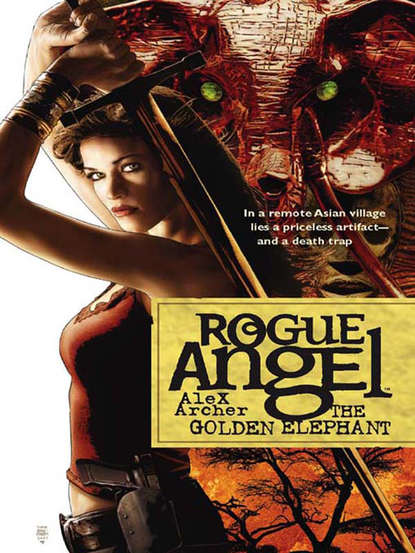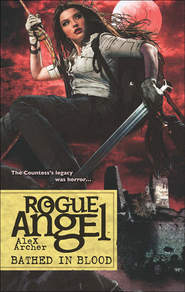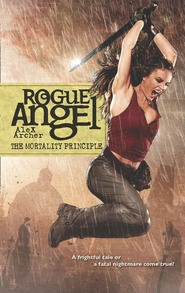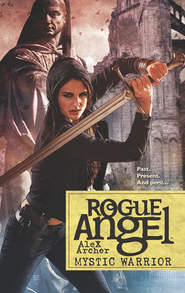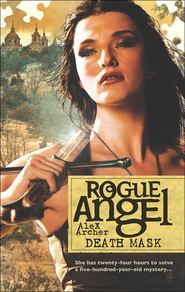По всем вопросам обращайтесь на: info@litportal.ru
(©) 2003-2025.
✖
The Golden Elephant
Автор
Год написания книги
2019
Настройки чтения
Размер шрифта
Высота строк
Поля
When her eyes and spirit were dry again, she took out the notepaper, ruled in faint blue lines, unfolded it under the lamp on the writing desk and examined it closely. The neat curls and swoops of the old scholar’s precise hand were engraved by the pressure of the pen that had written on the page above it.
Among the tools of the trade she carried with her were a sketch pad and graphite pencil. Extending the soft lead and brushing it across the sheet of paper, Annja was pleased when the writing appeared, white on gray.
She bit her lip. Not what I hoped, she thought. Not at all.
T HE LIGHTS INSIDE THE Channel striped the window next to Annja in the bright and modern Eurostar passenger car. Annja placed her fingertips against the cool glass of the window. It was still streaked on the outside with rain from the storm that had hit London as it moved out, well before it headed into the tunnel beneath the English Channel.
The weather fit her mood.
The notebook page, burned in the hotel room sink to ashes Annja had disposed of crumpled in a napkin in a public trashcan on the street, hadn’t held the key to the mystery of the Golden Elephant as Annja hoped. But Sir Sidney’s memory, and perhaps a little research, had unearthed what could prove to be a clue.
“The Antiquities of Indochina,” Hazelton had written. It appeared to be the title of a book or monograph, since beside it he had written a name—Duquesne.
He had either done a bit of digging on his own or called friends. Without checking his phone records she’d never know. Given her contacts in the cyber-underworld it was possible. But she didn’t want to risk tying herself to the case.
Perhaps he’d simply remembered. In any event, after jotting down a few grocery items he had written “Sorbonne only.” The word only was deeply outlined several times.
It was the only lead she had. But the gentle old scholar’s ungentle murderers also had it.
If Sir Sidney’s murder had been discovered by authorities, it hadn’t made it to the news by the time she boarded the train in the St. Pancras Station—quite close, ironically, both to Sir Sidney’s flat and the British Museum. She’d bought passage under the identity of a Brit headed on holiday on the Continent.
Roux was right, she thought. As usual. This business was expensive. She hoped the commission from this mysterious collector would cover it.
She grimaced then. Nothing would pay for Sir Sidney’s death. No money, anyway. Her resolve to bring retribution on his killer or killers had set like concrete. And she felt, perhaps irrationally, she had a good line on who at least one of them was.
Although she was renowned for going armed, and for proficiency in the use of various weapons—neither of which Annja was inclined to hold against her—cold-blooded murder had never seemed part of Easy Ngwenya’s repertoire. But perhaps greed had caused her to branch out. Annja only wondered how the South African tomb robber could have learned about her quest.
Unless their encounter in the museum—just that day, although it seemed a lifetime ago—was pure coincidence. Oxford educated, Ngwenya kept a house in London. She was known to spend a fair amount of time there. And given she really was a scholar of some repute, it wasn’t at all unlikely she’d find herself in the British Museum on a semiregular basis at least.
But Annja had a hard time buying it.
She made herself put those thoughts aside. You can’t condemn the woman—on no better evidence than you’ve got, no matter how much reason you have to be mad at her, she told herself sternly. For better or worse, from whatever source, you have the role of judge, jury and executioner. You’ve carried it out before. But if you get too self-righteous and indiscriminate, or even just make a mistake—how much better are you than the monsters you’ve set out to slay?
6
“So, you work for an American television program, Ms. Creed?” The curator was a trim, tiny Asian woman with a gray-dusted bun of dark hair piled behind her head and a very conservative gray suit. Annja guessed she must be Vietnamese.
“That’s right, Madame Duval,” she said. “It’s called Chasing History’s Monsters. ”
The woman’s already small mouth almost disappeared in a grimace of disapproval. “I’m employed as—” She started to say “devil’s advocate.” Taking note of the silver crucifix worn in the slightly frilled front of Madame Duval’s extremely pale blue blouse, Annja changed it on the fly. “I’m the voice of reason, on a show which, I’m afraid, sometimes runs to the sensational.”
Did she defrost a degree or two? Annja wondered.
“Why precisely do you seek credentialing to the University of Paris system, Ms. Creed?”
The University of Paris, commonly known as the Sorbonne after the commune’s 750-year-old college, was actually a collection of thirteen autonomous but affiliated universities. Annja stood talking with the assistant curator for the whole system in the highly modernized offices of University I, Panthéon-Sorbonne, one of the four modern universities located in the actual Sorbonne complex itself. If accepted as a legitimate scholarly researcher, she would gain access to collections throughout the system, even those normally closed to the public.
Annja smiled. “Whenever possible I like to combine what I like to call my proper academic pursuits with my work for the show. As an archaeologist I specialize in medieval and Renaissance documents in Romance languages. The predominant language, of course, being French.”
The woman smiled, if tightly. She was definitely warming.
“I have a particular interest in the witch trials of the Renaissance,” Annja said. She knew she gained a certain credibility because she showed she knew when the real bulk of the witch prosecutions took place; most people, including way too many college professors, thought they were a phenomenon of the Middle Ages. Still, the woman stiffened again, ever so slightly.
Annja was hyperattuned to her body language—and keying on that very reaction. “As what you might call the show’s revisionist,” she said, “I am particularly interested in the notion that the church might have had some justification for its actions in the matter. Not their methods, necessarily, but rather the possibility there existed a sort of witch culture that posed a real and deliberate threat to the church. Instead of the whole thing being a sort of mass hysteria, as is mostly assumed these days.”
Everything she said was true in the most legalistic and technical sense. There were such notions; they interested Annja.
Madame Duval smiled. “That appears to me to be a perfectly legitimate course of study,” she said in her own academic French. “If you will come with me, young lady, we will begin the paperwork to provide you the proper credentials.”
“Thank you,” Annja said.
F OUR HOURS LATER A NNJA’S vision was practically swimming. She was accustomed to deciphering fairly arcane writing. The Antiquities of Indochina was printed in a near-microscopic font. Unfortunately, unlike her Internet browsers, Annja’s eyes didn’t come with a handy zoom feature. The early-twentieth-century French itself was no problem; it was just hard to see.
Her heart jumped as she made out the words:
…the 1913 German expedition to Southeast Asia turned up many marvels indeed. Its reports included a fabulous hilltop temple complex, hidden in the reclaiming arms of the jungle, with the breathtaking golden idol of an elephant in its midst.
The passage then went on to talk about rubber production in Hanoi Province, in what was now Vietnam.
“Wait,” Annja said aloud, drawing glares from other researchers in the reading room. She glared back until they dropped their eyes back to tomes and computer screens.
Of course she felt bad about it at once. It’s not their fault, she reminded herself sternly.
Isn’t there more? she wondered.
She returned her attention to the book.
The crisp evening air felt good and smelled of roasting chestnuts. Annja was hungry, walking the summit of Montmartre with her hands jammed in her jacket pockets and her chin sunk into the collar. Over her left shoulder loomed the white domes of the Sacré Coeur Basilica. From somewhere in the middle distance skirled North African music. From nearer at hand came the thud and clank of what she considered mediocre techno music. The days of the Moulin Rouge and other noted, or notorious, cabarets were long gone. The fashionable night spots had long since migrated down across the river to the Left Bank and city center. Nowadays the area was given over to generic discos, artists’ studios and souvenir and antique shops, most of which were closed in the early evening.
Annja had found a fairly deserted section of the windy, narrow streets winding gradually down the hill. That suited her mood.
The one reference to the 1913 German expedition had been it. Not just for the book. For such as she’d been able to check of the University of Paris collection until they booted her out of the reading room at seven-thirty.
The good news was that she now knew stories of a golden elephant statue in a vast lost temple emanated from a German expedition to Southeast Asia in 1913. The bad news was that wasn’t much to go on.
It hadn’t been enough to lead to any more information, at least so far. The various archaeological reviews and journals from the period she had read stayed resolutely mute concerning any such expedition. She would have thought there’d be some mention.
Walking along in air just too warm for her breath to be visible, with fallen dry leaves skittering before her like small frightened mammals, she wondered if chauvinism might have come into play. The Great War, as it was then naively known—and for a few years afterward, until an even greater one happened along—broke out a year or so after the expedition. Indeed, if it set forth in 1913 the expedition might well have still been in progress when the First World War began. And in 1913 the French were still grumpy over the Franco-Prussian War.
So it struck her as possible that mention of German expeditions might’ve been embargoed in French journals. But scientists of the day still would have considered themselves above such political disputes, cataclysmic as they might be. Wars came and went—science endured. So the Germanophobe angle might mean much or little.
I see two main possibilities, Annja told herself as she turned down a quaintly cobbled alley between steel-shuttered storefronts that reminded her of home in Brooklyn. One, that the expedition simply got lost in the shuffle of World War I. It was easy enough to see how that would happen.
And two, she thought, the frown etching itself deeper into her forehead, that it was all just rumor.
That made her bare her teeth in dismay. It was possible. Probable, even. Scientific anthropology and archaeology were rife with such speculations in the wake of Schliemann’s discovery of Troy—or a reasonable facsimile thereof.
So the whole Golden Elephant yarn could just be hyperactive imagination.





